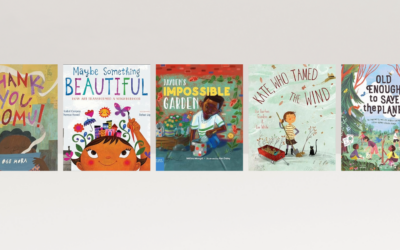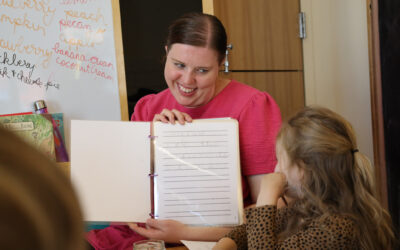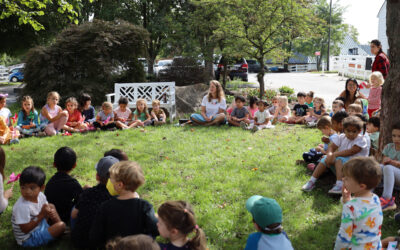Written by Shannon Brown, Children’s House Guide

An Adolescent reading to Children’s House friends.
Perhaps the most dramatic jump in language development is the growth of vocabulary that occurs between the ages of two to six. This explosion in language does not occur at any other time in your child’s life! This is why Montessorians refer to this timeframe a “sensitive period” for language.
Children exposed to rich language during this window will seemingly absorb new vocabulary, spark new interests, develop conversational skills, as well as build social confidence and greater independence.
The child’s sensitive period for language shows itself as an insatiable hunger for words. We use rich vocabulary in the classroom (rhombus, vibration, translucent, etc.), not for the purposes of memorization, but expose your child to the richness of language and the world around him. Your child is ecstatic to learn and apply this new vocabulary. As we get to know your child’s interests, we provide (and often create new) materials to reflect those interests. These materials often spark the interest of others in the class and the energy is infectious! Guides often find themselves learning alongside the children.

Ms. Marketa offers a lesson to two Children’s House children.
The Children’s House environment provides your child countless opportunities to listen and to speak – ie, the art of conversation. These lessons begin the first day your child walks through the door. Whenever a Guide or Assistant is sharing a “true story,” eliciting a conversation from your child’s drawing, singing a song, or reading a book to the group, she is serving as a model for language. Whenever your child is sharing a personal anecdote with us, we elicit conversation to help him formulate, organize, and refine his thoughts. We ask basic comprehension questions to help him identify the characters and the setting. Who was with you? Where did that happen? Did you enjoy it?
When we respond to what your child has said and ask him to provide more detail, we are modeling the dynamics of having a conversation. When we are listening to your child, we do so with interest and presence, because we want your child to feel that what he says has great value. We make eye contact and show your child that he has our undivided attention. These are essential social skills that will benefit your child throughout his life! Practicing conversations will also support the child in developing clear enunciation and pronunciation, which are important aspects of communication. Finally, these experiences will strengthen your child’s listening skills, for in order to listen effectively, one must inhibit talking, which requires the development of the will.
The nurturing environment of the Montessori classroom provides a safe and supportive space for your child to find his voice and feel comfortable to express his thoughts and opinions. With time, he will grow his confidence and ability to communicate his thoughts to others. Developing confidence in his ability to express himself frees your child from being dependent on others to speak for him. He will be empowered to express his feelings to others, and learn to resolve his conflicts independently.
Parent Challenge of the Month:
Listen carefully to the language you use with your child. Is it mostly directive (giving instructions) or is it full of rich vocabulary? Challenge yourself to sit down and have a conversation with your child at least once a day for the next month. You’ll be amazed as she begins to use colorful adjectives and specific verbs in her conversations!




